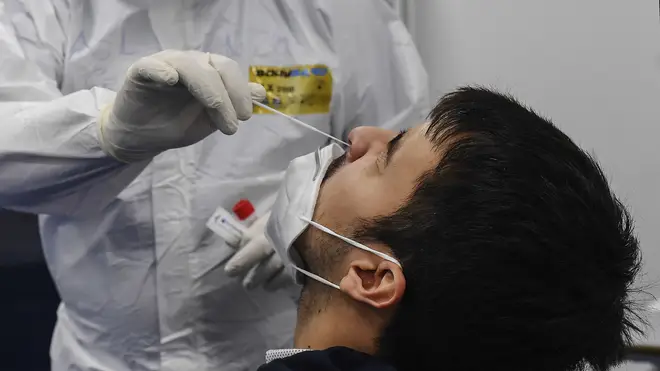
Shelagh Fogarty 1pm - 4pm
1 October 2020, 20:30

Four out of five people with sudden loss of smell or taste tested positive for Covid-19 antibodies, new research has suggested.
The findings suggest an acute loss of smell or taste is a highly reliable virus indicator, scientists say.
They add that loss of smell or taste should now be considered globally as a criterion for self-isolation, testing and contact tracing.
Researchers at UCL and UCLH (University College London Hospitals NHS Foundation Trust) assessed health data from primary care centres in London.
Read more: New lockdown rules for Liverpool, Warrington, Hartlepool and Middlesbrough
Read more: SNP MP has whip removed after Covid rule breach despite testing positive
They found that 78 per cent of people who reported sudden loss of smell and/or taste at the height of the pandemic had Covid-19 antibodies.
Of these people, 40 per cent did not have a cough or fever.

Brewdog boss tells LBC what impact the 10pm curfew is having on his pubs
According to the researchers it is the first time such a figure has been calculated.
Lead author Professor Rachel Batterham, of UCL Medicine and UCLH, said: "As we approach a second wave of infections, early recognition of Covid-19 symptoms by the public together with rapid self-isolation and testing will be of vital importance to limit the disease's spread.
Read more: Jeremy Hunt: PM's father 'shouldn't be fined for shopping without face mask'
Read more: Spread of Covid-19 in England 'may be slowing'
"While people in the UK who experience sudden onset loss of smell or taste are advised to self-isolate and seek a test, at a global level few countries recognise this symptom as a Covid-19 indicator - most focus on fever and respiratory symptoms.
"Our findings show that loss of smell and taste is a highly reliable indicator that someone is likely to have Covid-19 and if we are to reduce the spread of this pandemic, it should now be considered by governments globally as a criterion for self-isolation, testing, and contact tracing."

Sadiq Khan on Jeremy Corbyn and Stanley Johnson's coronavirus breach
Between April 23 and May 14, researchers sent texts to people registered with a number of primary care centres in London who had reported sudden loss in their sense of smell and/or taste.
A total of 590 participants enrolled via a web-based platform and responded to questions about loss of smell and taste and other Covid-19-related symptoms.
Of these, 567 then had a consultation with a healthcare professional who confirmed the history of their symptoms and supervised a test to find out if they had coronavirus antibodies.
The study, published in PLOS Medicine, found that 77.6 per cent of 567 people with smell and/or taste loss had SARS-CoV-2 antibodies.
Of these 39.8 per cent did not have a cough or fever, and participants with loss of smell were three times more likely to have SARS-CoV-2 antibodies, compared with those with loss of taste.
Prof Batterham added: "Our research suggests a key public health message should be: people who notice a loss in their ability to smell everyday household odours such as garlic, onions, coffee, and perfumes should self-isolate and seek a coronavirus PCR swab test."